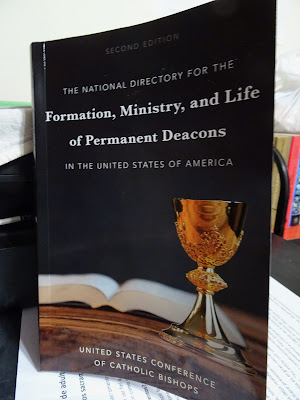The diaconate is oriented toward the whole People of God.
Guiding force of the diakonia of the church
Citing Pope St. John Paul II again, the Directory notes that the deacon’s tasks, include ”promoting and sustaining the apostolic activities of the laity.” Thus, the deacon, as one “more present and more involved than priests in secular environments and structures” ought to ‘foster closeness between the ordained ministry and lay activities, in common service to the Kingdom of God.”
I find this encouraging because it points to the common roots of our service in our Baptism and presents a way to understand the deacon’s intimate relation with the laity. He does not serve on his own but is called, as several popes have noted, to be “the animator, the driving force” of the diakonia of the whole Church.
I have written on this in an earlier post, based on my experience. This is an interesting way to help understand the deacon – as clergy, but intimately related to the laity.
The deacon at the threshold
In the next section of Paragraph 31, the Directory, again citing Pope St. John Paul II, notes an important aspect of the deacon: the presence of the church in the “secular” world:
“…a deeply felt need in the decision to reestablish the permanent diaconate was and is that of a greater and more direct presence of Church ministers in the various spheres of family, work, school, etc.”The deacon, involved every day in the world outside the church, “can relate the rich tradition of Catholic teaching to the practical problems experienced by people.”
They can even, as envisioned by the priests discussing the diaconate in the Dachau concentration camp in Nazi Germany, provide a look into what is happening in the world, so that the Church is not caught off-guard in the face of the evils of Nazism and other oppressive regimes.
The deacon provides an entry for the institutional church, of the clergy, into the lived experience of the People of God – as well as all the people of the world. The deacon is thus a ”minister of the threshold,” as described in Tim O’ Donnell’s The Deacon: Icon of Christ the Servant, Minister of the Threshold. (I reviewed it here.)
Being on the threshold can be important for a deacon – showing with his life, and not only his words, the intersect of faith and life. He can bring the world to the altar and the altar to the world.
In some ways, I don’t fit this dimension of the deacon – being a celibate who is a full time volunteer with the church. But I think it is an extremely important dimension of the diaconate.
It speaks to what I have promoted for decades – the dignity of work and the witness of the worker in her or his work environment, not by what one says but by how one lives.
When I was a campus minister, I often heard some students lamenting that they weren’t involved in the church, that is, in the activities based in the parish or student center. I still hear that here in Honduras where some people lament that they aren’t more involved in church activities. But I say: What you do in the church is important, but perhaps even more important is how you live as Church, as People of God, in the world, sanctifying the world with your presence, your daily work.
As the Directory notes, “In their secular employment, deacons also make evident the dignity of human work.” They can show in their professions the presence of the Incarnate God, who did not cringe from being called the son of a carpenter.
What might change in our way of living faith and in our culture when we see a deacon on the altar with hands marked by calluses, signs of hard manual labor?
I have a priest friend who jokingly used to say of his vocation, “These hands are made for chalices, no calluses.” I think he would agree that the callused hands of a deacon might be signs of the God who works among us.
The deacon, working outside the institution, can show the dignity of work and he also can see, in his work, “an opportunity and obligation… to bold proclaim and witness the Gospel of life,” not only in words but in his way of living.
This recalls one of my favorite quotes of Thomas Merton:
“The saint preaches sermons by the way he walks and talks, the way he picks up things, and holds them in his hand.”Such can be the sermon of the deacon in his daily work. A marvelous vocation.





No comments:
Post a Comment